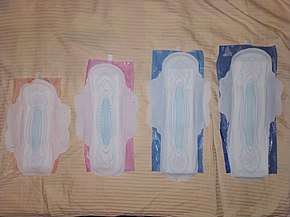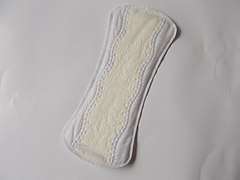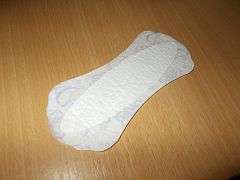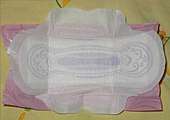Always (brand)
Always is an American brand of menstrual hygiene products, including maxi pads, ultra thin pads, pantiliners, and feminine wipes, produced by Procter & Gamble. It was first introduced in the United States in test markets in the spring of 1983, then nationally in May 1984. By the end of 1984, Always had also been introduced internationally in United Kingdom, Canada, France, Germany, and Africa. According to Rising Tide: Lessons from 165 Years of Brand Building at Procter & Gamble, Always was Procter & Gamble's "first truly global brand."[1]
| Product type | Feminine hygiene line, including: Maxi pads Ultra Thin pads Pantiliners Cleansing wipes |
|---|---|
| Owner | Procter & Gamble |
| Country | United States |
| Introduced | 1983 |
| Related brands | Whisper (Australia and Asian countries) Lines (Italy) Orkid (Turkey) Evax/Ausonia (Spain and Portugal) Tampax |
| Markets | Worldwide |
| Tagline | "Rewrite the rules, always" |
| Website | www |
Always is sold under the name Whisper in Japan, Singapore, India, China, South Korea, Philippines, Thailand, Hong Kong, Taiwan, Vietnam, Malaysia, Australia, Cambodia and Indonesia, under the name Lines in Italy, under the name Orkid in Turkey, and under the names Evax and Ausonia in Spain and Portugal. Marketing for the product includes the company's BeingGirl website.[2][3]
The product is manufactured in Belleville, Ontario, Canada at a 700,000-sq.-ft. plant with 175,000-sq.-ft. of warehouse.[4] The plant is one of Procter & Gamble's largest in North America.
Marketing
The "Like a Girl" campaign from Leo Burnett won the 2015 Emmy Award for outstanding commercial. Lauren Greenfield directed the spot, which debuted in June 2014 and aired during Super Bowl XLIX. The commercial asked the question "When did doing something 'like a girl' become an insult?" [5] Running, throwing or fighting like a girl[5] are seen by adults as equivalent to weak, but by young girls as strong.[6]
In popular culture
.jpg)
In Tbilisi, Georgia the Bridge of Peace is nicknamed the Always Ultra Bridge for its resemblance to a maxi-pad.[7][8]
Gallery


 Always Platinum Pantyliner
Always Platinum Pantyliner Always dailies long
Always dailies long Discreet Pantylinner
Discreet Pantylinner Discreet Normal
Discreet Normal
 Always Sensitive
Always Sensitive
See also
References
- Davis, Dyer; et al. (May 1, 2004). Rising Tide: Lessons from 165 Years of Brand Building at Procter and Gamble. Harvard Business Press. pp. 190–191, 421. Retrieved 2013-05-07.
- Palmer, Alex (January 1, 2011). "Marketers strike a balance between skeptical teens and their cautious parents". Direct Marketing News. Retrieved March 30, 2012.
- Nutter, Blaise (August 31, 2009). "5 rules for marketing in niche social networks". iMediaConnection. Archived from the original on October 6, 2012. Retrieved March 30, 2012.
- nurun.com. "UPDATED: P&G plant in Belleville important". The Belleville Intelligencer. Retrieved 2017-10-12.
- Diaz, Ann-Christine (September 13, 2015). "Always' Hard-Hitting 'Like a Girl' Wins 2015 Outstanding Commercial Emmy". Advertising Age. Retrieved March 16, 2017.
- "Rhetorical Analysis of Always's 'Like a Girl' Advertisement". October 2, 2014.
- "A new look for Old Tbilisi", The Economist, OCTOBER 06, 2010 Archived May 12, 2014, at the Wayback Machine
- Georgia, Armenia and Azerbaijan, Lonely Planet, p.122